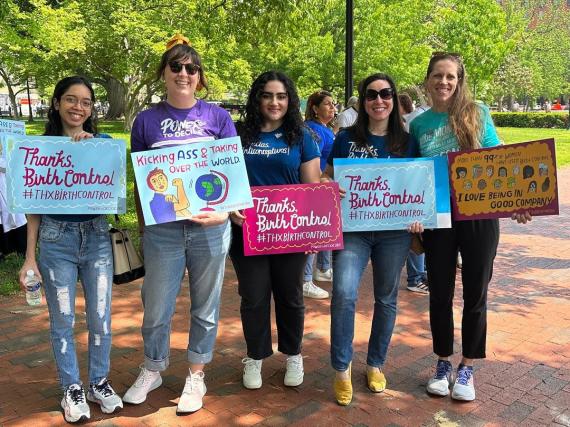My Sex Ed Experience, What I Wish I Had, and How We Can Advocate for Sex Ed that Meets the Needs of All Young People
“Stay away from boys,” was what I distinctively remember coming from my mother’s mouth when I had my first menstrual cycle. While she said other things about how I’m growing up and becoming a woman, that line stuck with me. It stuck with me because I could not, for the life of me, figure what boys had to do with my cramping belly and stained pants. And, unfortunately, that was the only time in my adolescence I received anything relatively close to “the talk” from either of my parents.
I grew up in a religious, Caribbean household to first-generation parents who moved to this country just a couple of years before I was born. Their approach to sex was “if we don’t talk about it, it won’t happen.” And as a young Catholic girl, who went to Sunday and Wednesday school, sex was never discussed, unless we were discussing the benefits of marriage.
Looking back, my sex education was like a puzzle piece with a lot, and I mean a lot of the pieces missing. From my peers, I got medically inaccurate information—like you can’t get pregnant your first time. From secondary school, I got a 3-day, 40-minute lesson from my gym coach about abstinence and the dangers of sex. From the internet, I was bombarded with information I wasn’t developmentally ready for, which led to more questions.
As a teen, I was put in a position where I had to figure out which of these pieces of information were right or wrong about sex. It ultimately hindered my ability to make informed decisions about my body. This is likely the experience of other young people across the US, especially those in the 21 states that do not mandate sex education in schools or the 15 states that do not require content regarding human immunodeficiency virus (HIV) or sexually transmitted infections (STI) to be evidence-informed, medically accurate and complete, age and developmentally appropriate, or culturally responsive.
It is clear there’s a problem with how young people are educated on sex, so what can be done, nationally, to make sure there is sex education for all? This is where the Real Education and Access for Healthy Youth Act (REAHYA) comes in.
Introduced on Tuesday, May 18, 2021, this bill combines two previous bills, the Real Education for Healthy Youth Act and the Youth Access to Sexual Health Services Act. REAHYA aims to provide young people with the sex education and sexual health services they need to make informed decisions about their bodies and lives. Led by Representatives Barbara Lee (D-CA) and Alma Adams (D-NC) in the US House and Senators Cory Booker (D-NJ) and Mazie Hirono (D-HI) in the US Senate, the bill asks for an expansion of quality sex education and access to sexual health services across the nation and funding programs that recognize young people’s right to sex education and sexual health services.
The bill also calls for:
- Amending the Public Health Service Act and the Every Student Succeeds Act to enable education that does not stigmatize sex, is non-shaming of LGBTQ students, and is inclusive of contraceptive access in schools.
- Creating grants for professional development and teacher training for elementary and secondary education sex educators.
- Eliminating and reprogramming the Social Security Act Title V abstinence-only-until-marriage state grant program to fund the new grants.
The sex education I received was medically inaccurate, restrictive, and incomplete. Combined with a lack of sex education in the home, I was not prepared for what to do in an intimate situation or the nuances of sex. I believed that if I went through with it, teen pregnancy and STIs were all I’d get. I often think if sex wasn’t stigmatized for me as an adolescent girl, then I wouldn’t have to spend years in my early adulthood unlearning that engaging in sex is “bad.”. I could have had that time back and instead spent it exploring what I liked and what I didn’t like.
The hope is that with this bill young people can be equipped with medically accurate, developmentally appropriate, and accessible sex education so they can make informed decisions on their bodies and lives.
While we’re one step closer to getting comprehensive sex education for all, we’re not there yet. Your support can help. Here’s what you can do today:
- Contact your members of Congress to ask them to support and cosponsor REAHYA. We’ve made it easy for you!
- Show your support via Twitter, Instagram, or any other social media platform for the members of Congress supporting this bill using these hashtags: #REAHYA #SexEdforAll
Angela Osmar is the Public Policy Intern at Power to Decide where she assists the Public Policy team with federal policy issues. She attends the University of Central Florida where she studies Public Policy Analysis & Management and she hopes to work in health policy, advocating for women’s rights.



